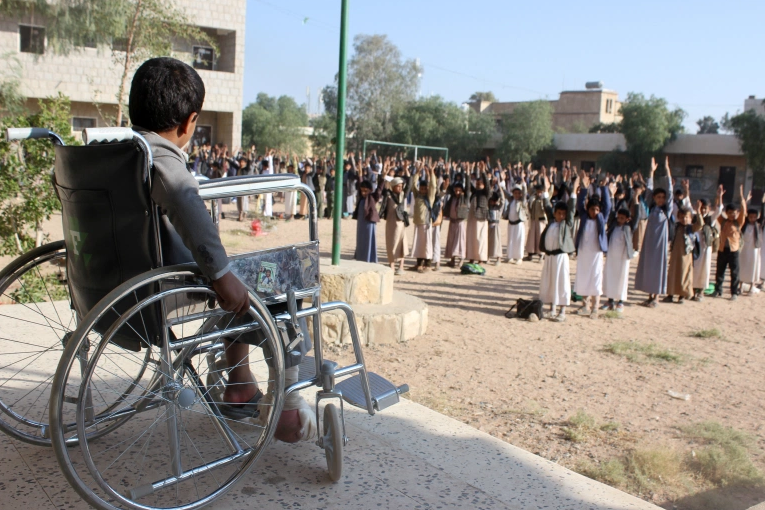Par Allan Rock : Aljazeera : 05-04-2021
Children around the world suffer the consequences of war – they are routinely killed, maimed, recruited to fight, and otherwise abused. In 2020, the United Nations reported more than 25,000 such grave violations in the previous year.
UN Secretary-General Antonio Guterres has powerful tools at his disposal to pressure those responsible to end such abuses. But he is failing to use them, often placing politics above children’s lives.
Over the past 20 years, the UN Security Council has put in place a framework to protect children in conflict zones. It requires the secretary-general to report every year on grave violations against children, including killing and maiming; recruiting child soldiers; sexual violence; and bombing schools. The secretary-general is required to attach a list of those responsible to his report.
The “list of shame”, as it is sometimes called, is the linchpin for holding parties accountable for grave violations. When used as intended, the list has been a remarkably effective tool. Governments and non-state armed actors alike dread the stigma of being listed and are motivated to engage with the UN on steps they can take to end their abuses and be removed from the list.
I have seen for myself the power of the list. In 2006, I served as a UN special adviser on children and armed conflict in Sri Lanka, where I met with dozens of heartbroken families whose children had been abducted by the Tamil Tigers or the government-linked Tamil Makkal Viduthalai Pulikal (TMVP) and forced to fight in Sri Lanka’s civil war. The TMVP was added to the “list of shame” in 2006. Following intensive dialogue with the United Nations Children’s Fund (UNICEF), it signed and implemented an action plan to end the abductions, and it was removed from the list in 2011.
At that time there was a palpable sense of optimism among those of us working to protect children in armed conflict. We saw the secretary-general’s list as a strong instrument to root out practices like recruiting child soldiers. And for many years, it was. In addition to the TMVP in Sri Lanka, the list shamed many others into changing their ways, among them the Maoists in Nepal, the Moro Islamic Liberation Front in the Philippines, and government forces in Chad, Uganda, the Democratic Republic of the Congo (DRC), and Sudan.
In recent years, however, decisions about listing have become increasingly politicised, undermining the list’s potential to protect children. For example, in 2016, the UN’s then-Secretary-General Ban Ki-moon removed the Saudi-led coalition in Yemen from his list, even though coalition air strikes killed more than 450 children and injured hundreds the previous year. The reason? Saudi threats to withdraw UN funding.
Although Secretary-General Guterres returned the Saudi coalition to his list in 2017, he removed it again in 2020, despite the UN’s own findings that the coalition was responsible for at least 222 child casualties the previous year. Guterres has also removed the Myanmar armed forces, the Tatmadaw, from the list for recruiting and using children, despite hundreds of documented violations in 2019 and 2020.
These betrayals prompted me to join a group of international children’s rights experts to conduct a systematic review of the secretary-general’s listing and delisting decisions over the past decade and to make recommendations to end the politicisation of this process.
The extent of the discrepancies we found was shocking. There is a clear mismatch between information about violations documented by the UN itself and the groups and government forces on the list. Our review identified dozens of cases in which multiple violations did not lead to listing, or in which listing decisions reflected unexplained inconsistencies.
Our analysis also found that government forces have often had a free pass for committing violations. Of eight parties responsible for killing and maiming more than 100 children in a one-year period that were not listed, six were governments, including state-armed forces or international forces in Afghanistan, the DRC, Israel, Nigeria, and Yemen. Israeli and Afghan government forces have each been responsible for thousands of child injuries and deaths since 2014, but have never been listed.
Protecting children – among the most vulnerable in war – should be a politics-free zone. Their interests should be paramount when calling out abuses. Secretary-General Guterres needs to address the issues we have identified and produce a credible, accurate, and evidence-based list in his upcoming annual report. Treating parties to conflict based on their conduct, not their political influence, is the only way to restore the list as a powerful tool in responding to grave violations against children in war.
Allan Rock was Canada’s ambassador to the UN from 2003 to 2006 and served as a UN special adviser on children and armed conflict in Sri Lanka. He is president emeritus of the University of Ottawa and a professor in its Faculty of Law.
The views expressed in this article are the author’s own and do not necessarily reflect Al Jazeera’s editorial stance.


Recent Comments